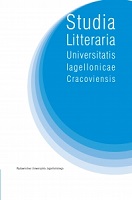Deuil et mélancolie de Narcisse : Le joli buisson de jeunesse de Jean Froissart (1373)
Mourning and Melancholia of Narcissus: Jean Froissart’s Le joli buisson de jeunesse (1373)
Author(s): Agata SobczykSubject(s): Cultural history, French Literature, Health and medicine and law, 13th to 14th Centuries
Published by: Wydawnictwo Uniwersytetu Jagiellońskiego
Keywords: nostalgia; mourning; loss; Ovid; Narcissus; Jean Froissart;
Summary/Abstract: Narcissus appears as imbued with melancholy both in Ovid’s Metamorphoses and in the poetry of the sixteenth and seventeenth centuries. In the Middle Ages, the association between this figure and melancholy can be perceived in its various uses. But the Narcissus who seems the most melancholic is the one that Jean Froissart includes in Joli buisson de jeunesse, profoundly modifying the Ovidian myth. The researchers consider this one to represent the archetype of the lover. However, the author of the paper suggests that Froissart goes beyond the domain of love and the theme of courtly love: it is no longer the question of the inaccessibility of the object, nor exclusively of the loss of the object, but of any loss inherent in the passage of time. The association of narcissism with mourning entails the nostalgia that seems specific to Froissart’s work since it is found, in different forms, both in his Chronicles and in his lyrical work.
Journal: Studia Litteraria Universitatis Iagellonicae Cracoviensis
- Issue Year: 17/2022
- Issue No: 1
- Page Range: 37-48
- Page Count: 12
- Language: French

